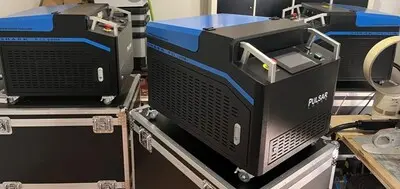
Laser cleaning technologies are gaining traction as a critical approach for various industrial applications. These systems utilize high-powered laser beams to effectively degrade contaminants such as rust, paint, and other residues from substrate. The precise nature of laser cleaning allows for selective treatment, minimizing damage to the underlying surface. ,In addition, the process is environmentally friendly as it relies on minimal chemicals.
This makes laser cleaning an attractive alternative to traditional cleaning methods, delivering significant improvements in terms of efficiency, precision, and environmental impact.
Numerous industries benefit from laser cleaning technologies for a spectrum of applications, including aerospace.
The ability to sanitize intricate components with high accuracy makes laser cleaning an invaluable tool in these sectors.
With ongoing technological advancements, laser cleaning is poised for further growth in the years to come, offering innovative solutions across a wider range of industries.
Effortlessly Strip Wood with a Laser Stripper Effortlessly Remove Wood Finish with a Laser Stripper
Tired of the messy process of manually stripping wood? Enter the laser stripper, a revolutionary tool that makes light work of removing old finish and varnish. This innovative device utilizes a high-powered check here beam to precisely melt away layers of paint, lacquer, or stain without causing any damage to the underlying wood. With its focused application, you can quickly strip even hard coatings with minimal effort.
The laser stripper offers a number of benefits over traditional stripping methods. It's incredibly powerful, reducing the time and energy required for the job. Plus, it generates less waste, making it a more eco-friendly option. The laser stripper also provides greater precision, allowing you to target specific areas with ease and avoid damaging surrounding surfaces.
- Features of using a laser stripper:
- Fast stripping process
- Little damage to wood surface
- Controlled application for targeted removal
- Environmentally friendly operation with less waste
Laser Surface Renewal
In the ever-evolving landscape of industrial manufacturing and surface restoration , laser stripping has emerged as a revolutionary solution. This cutting-edge technology utilizes highly focused laser beams to meticulously remove unwanted coatings, paints, or other surface layers without affecting the underlying substrate. Laser stripping offers numerous advantages over traditional methods, such as its remarkable precision, minimal material waste generation, and reduced environmental impact.
- Furthermore , laser stripping can be accurately applied to a broad range of materials, including metals, plastics, and composites.
- As a result , it has found widespread applications in industries such as automotive manufacturing, aerospace, electronics, and construction.
By minimizing material waste and reducing reliance on harsh chemicals, laser stripping presents a eco-friendly approach to surface treatment. As the demand for sustainable practices continues to grow, laser stripping is poised to play an even more crucial role in shaping the future of surface technology .
Unlocking it's Power for Lasers for Wood Restoration
The realm of wood restoration has been significantly/completely/greatly revolutionized by the advent of laser technology. These precise and focused beams of light can be utilized/employed/ harnessed to remove surface/existing/embedded damage with remarkable/exceptional/outstanding accuracy, preserving the natural/original/authentic beauty of antique wood pieces. Lasers offer a non-invasive/gentle/minimal approach compared to traditional methods, minimizing the risk of further deterioration or weakening the structure/integrity/framework of the wood.
Furthermore, laser restoration can be employed/utilized/applied for a broad/wide/diverse range of applications, including/such as/encompassing the removal of scratches, stains, and particularly deeply/heavily/thoroughly embedded imperfections. The versatility/adaptability/flexibility of laser technology allows for targeted/specific/precise treatments, ensuring that each restoration project is approached with care/precision/meticulousness.
- Modern/Contemporary/Advanced laser technology has become an indispensable/essential/vital tool in the hands of skilled wood restorers, enabling them to rejuvenate/repair/restore wooden artifacts and furniture to their former glory.
Deconstructing Coatings and Finishes with Laser Precision
In various industries, the need to specifically remove coatings and finishes is paramount. Traditional methods often involve harsh chemicals or abrasive tools, which can be damaging to underlying substrates and pose environmental hazards. However, laser technology offers a sophisticated solution for this challenge. Laser systems employ focused beams of light to ablate coatings with exceptional precision, minimizing damage to the base material. This adaptable approach is particularly beneficial in sectors like aerospace, automotive, and electronics, where the removal of unwanted layers is crucial for maintenance, repair, or reconditioning.
- Benefits of Laser Coating Removal:
- Meticulous material removal with minimal heat-affected zones.
- Elevated surface quality and finish preparation for subsequent treatments.
- Minimized environmental impact compared to traditional methods.
Laser coating removal systems can be tailored to accommodate a wide range of materials and applications. The power density and pulse duration of the laser beam are carefully regulated to achieve optimal results while minimizing collateral damage. Furthermore, the non-contact nature of laser processing reduces contamination risks and ensures a clean working environment.
Harnessing Lasers for the Future of Wood Stripping
The carpentry industry is on the brink of a radical shift, driven by the integration of cutting-edge laser technology for wood stripping. This innovative approach offers numerous advantages over traditional methods, promising increased detail and efficiency. Lasers can precisely remove the outer layer of wood, revealing the beautiful grain beneath. Additionally, laser stripping is a clean process, minimizing environmental impact and creating a healthier workplace for artisans.
- Conventional methods often result in damage to the wood's surface, compromising its aesthetic appeal.
- In contrast, lasers remove material without scorching it, preserving the wood's natural appeal.
- This precision is particularly valuable for antique furniture, where maintaining the authenticity of the wood is paramount.
Therefore, laser technology is poised to transform the future of wood stripping, empowering artisans to create more durable and stunning works of art.